J. Pepper Bryars: Why we should avoid an immediate special session for the gas tax

Many Alabamians, including the conservative-leaning Alabama Policy Institute, agree our state needs to increase funding for roads and bridges. And Governor Kay Ivey hasn’t yet ruled out calling the state legislature into a special session to raise the gas tax when lawmakers convene Tuesday in Montgomery. But is fast-tracking a $300 million tax increase a good idea? Probably not. True, calling lawmakers into a special session would free them from having to multitask the dozens of other issues they’d normally be dealing with. State senators, state representatives, and their staffs could focus intently on the legislation, and committees could schedule hearings and votes without worrying about competing events. But maybe we need to respect the normal process instead. Putting aside everything else and concentrating solely on something this big might normally make sense, but moving immediately into a special session this week may cause more problems than it’d solve. First, a third of the members of the legislature are brand new and this puts them in a very tight spot. They lack the benefit of having studied and debated this issue in recent years. Asking them to immediately cut their legislative teeth on a problem this monumental, this controversial, and this complicated may not be entirely fair. Besides, I can hear their opponent’s radio ad playing already: “We sent ol’ Billy Bob to Montgomery and the very first thing he did was vote to raise our taxes.” Ouch. They might not hear that ad until three years from now, but when they do, it sure will sting. Second, a special session may create the unintended appearance of ramming a tax increase through because of the shorter period of time needed and the lower hurdles required for passage. Spending only a handful of days on the issue — between introduction, debate, passage, and enactment — could look bad. It seems rushed, and begs the question: what’s the hurry? And needing fewer votes than normal for passage could also send the wrong message. That’s because in a normal legislative session, a 3/5th vote is needed in each chamber to advance a bill before the state budgets are done. In a special session that vote doesn’t happen. Removing that rather high bar — a safeguard that exists for a reason — begs another question: why not go through the normal process? And third, while a special session may afford lawmakers plenty of time since it’ll be what they’re working on all day long, such a rapid process wouldn’t give regular folks enough time to learn about the details, discuss the pros and cons of the bill in their communities, and let their state senators and state representatives know what they think. A special session could circumvent the normal feedback loop between elected officials and their constituents. That loop is especially important when it comes to tax increases. Lawmakers should also take note of what happened when tax increases were perceived to be rammed through the process recently in other states. Last week, Wyoming’s state legislature adjourned having failed to pass a tax increase that was strongly supported by its leadership in both chambers along with the state’s Republican governor. Why? Aside from the particulars, many voters felt things were moving way too fast. The bill was introduced in the House of Representatives on a Tuesday and passed out on a Friday. It then went to the upper chamber, where it was initially supported by a majority of senators seeking a quick vote until they began feeling the heat from angry constituents. Things fell apart, and their effort failed. And then there’s what happened to the chairman of the transportation committee in the Tennessee House of Representatives, State Rep. Barry “Boss” Doss. He was accused by some of breaking the chamber’s rules in 2017 so he could speed up the process and “ram” through the gas tax increase. Doss ended up drawing a challenger in the Republican Primary and ultimately lost his seat, one of only two GOP incumbents to lose that year. Some believe his parliamentary maneuvers were partly to blame. Alabama stands on the threshold of something big. We have the opportunity to bring real reform to our tax code — ending the practice of siphoning gas tax revenue to fund things unrelated to transportation, increasing the resources needed to improve our state’s roads and bridges, and lowering taxes that could help our poorest neighbors or increase economic activity. And as proposed by the Alabama Policy Institute and others, we can, and should, do all of that without increasing the overall tax burden. But we need to be patient, take our time, listen to others, and build a plan we all can support. Haste makes waste, and considering our state leaders are seeking to raise the gas tax by $300 million every year, waste is the last thing Alabama needs. J. Pepper Bryars is a native of Mobile who lives in Huntsville, is a senior fellow at the Alabama Policy Institute. Follow him on Twitter at @jpepperbryars.
Ahead of gas tax debate, API proffers three guiding imperatives to Alabama policymakers

With the 2019 Legislative Session less than a month away, and it’s no secret the sessions is expected to be dominated by discussions of how to fund Alabama’s road and infrastructure needs. One of the big proposals expected to considered this session is the gas tax, which is why on Monday the state’s right-leaning Alabama Policy Institute (API) released it’s tax position paper on said tax. In the position paper, API lays out their position on the gas tax by first asserting their support for increased investment in Alabama’s infrastructure. US Supreme Court Justice Oliver Wendell Holmes famously said that “taxes are what we pay for a civilized society.” The Alabama Policy Institute freely acknowledges that infrastructure is neither free nor is it unwanted. No rational voice would debate the need for a strong system of roads, bridges, ports and e-commerce. API also acknowledges with candor that there is no question that the cost of maintenance and construction of vital infrastructure has increased over time while Alabama’s chief source of state generated infrastructure revenue, the gas tax, has not increased one cent since 1992. But none of these candid admissions should be construed to mean that API suggests that conservatives should propose or accept a bare-bones tax increase as the only solution. The current governing majority must consider how best to govern in this revenue-depleted environment in such a way as to inspire confidence in their constituent consumers. API suggests that such confidence can be generated by considering certain conservative imperatives in the gas tax debate. The three imperatives for conservative policymakers API is referencing are: Taxes should always be the last resort: API believes that government should always look first to the goal of realigning the existing balance between current expenditures and resources before asking for taxpayers to sacrifice more. Taxes should never be raised without reforms: API believes that government should always strive to better its processes, increase its transparency, and mitigate waste. No tax should ever be raised without an equal decrease in other taxes: API acknowledges that government cannot provide essential services without the revenue to pay for those services. At the same time, however, there is a responsibility to be measured in the collection of revenue from the public. To further display their imperatives in action, API proffered two examples of “revenue enhancing legislation,” which follow them: Proposed bill #1 Would address reform measures that API deems “desperately needed” to stop a siphoning of funds from the current Road and Bridge Fund. Stop the practice of rebating gas taxes to organizations that use Alabama roads and bridges. Legislatively create an offset to the taxpayers by reducing the state portion of the existing grocery tax. Alabama is one of only seven states nationwide that fully taxes grocery sales, and one of only twelve that taxes groceries at any level. Allow for the general public to see where and how infrastructure dollars are spent. The Joint Legislative Transportation Committee should be given the ability to review and approve 5-10 year infrastructure plans that are set by well-reasoned criteria. Proposed bill #2 According to API, bill number two “represents the long game in infrastructure funding.” “The public should made aware of the little known fact that Alabama has a trust fund that currently holds in excess of $3.2 billion generated by offshore oil and gas exploration,” explained API. “The Alabama Trust Fund belongs to no one else but the people of this state.” Should be an immediate lobbying of the Trump administration to extend the State’s offshore boundaries by an additional 5-10 miles. The extended maritime limits would create additional revenues from oil and gas. Revenues from extended limits could then be appropriated, by a vote of the citizens of this State in the form of a constitutional amendment, to fund infrastructure. “It is possible to be a conservative and still debate an increase in taxes,” API explained.
Moving up the ranks: Rep. Gary Palmer elected to House leadership team
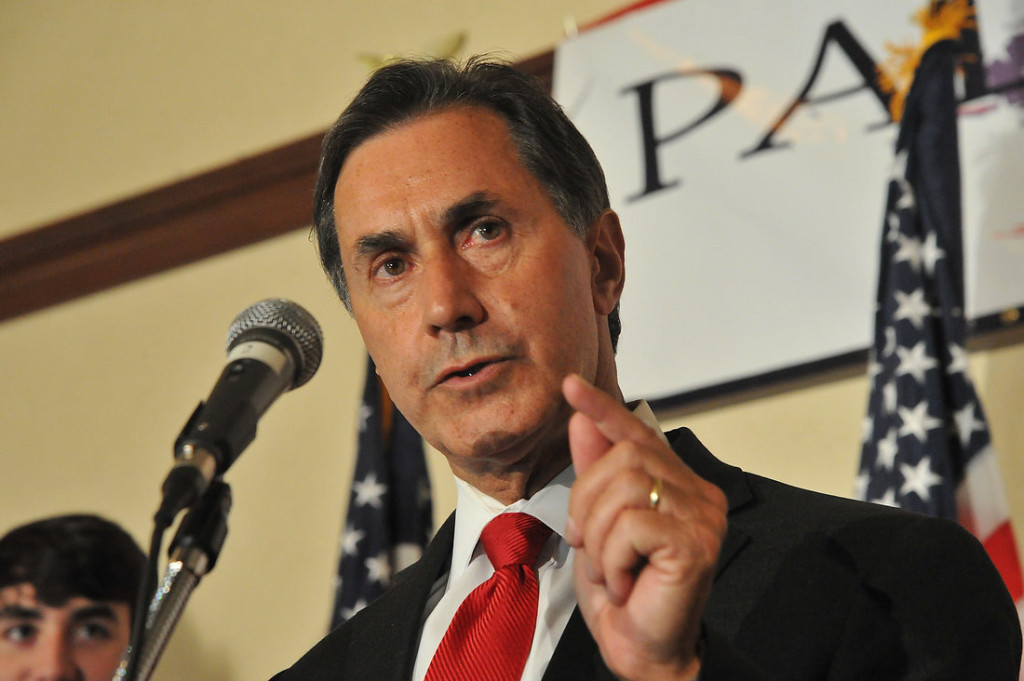
House Republicans chose their leadership team for the next Congress on Wednesday and among them is Alabama 6th District U.S. Rep. Gary Palmer. Palmer, who first joined Congress in 2015, was elected to the position of Republican Policy Committee Chair for the 116th Congress — the fifth highest ranking leadership position among House Republicans. Prior to this, Palmer served as the Vice Chairman of the Republican Policy Committee. “I appreciate the faith that my colleagues have placed in me and am grateful for their support,” Palmer said in a statement. “Throughout my career, I have focused on being a problem solver and developing and promoting sound policies, so I feel like I’m uniquely prepared for this role. I look forward to working with my colleagues as we continue advancing and promoting ideas supported by the American people.” Established in 1949 by the House Republican Conference, the Republican Policy Committee (RPC) is a place for Republicans in the House to generate quality legislative proposals. More specifically, “The RPC serves as an advisory Committee to House Republicans and provides a forum for Republican Members to discuss legislative proposals before the House. The Committee reports its findings and suggestions for consideration to the Republican Conference,” according to the RPC website. In his new role Palmer will tap into the experience and skill sets he developed at the Alabama Policy Institute (API), where he served as president for 24 years. During his tenure, the API became a full-spectrum public policy organization that engaged in virtually all policy issues that affected Alabamians. It is considered the premier conservative think-tank in Alabama. Palmer also sits on the House Budget Committee and the Oversight and Government Reform Committee. His Alabama House colleagues congratulated him following his election to the position. Congratulations to Alabama’s own @USRepGaryPalmer on being elected Policy Chair of @HouseGOP! https://t.co/rP9dFkpwBW — Rep. Bradley Byrne (@RepByrne) November 14, 2018 A big congratulations to my friend and Alabama delegation colleague @USRepGaryPalmer for being elected House GOP Policy Chair. Proud of you! — Rep. Martha Roby (@RepMarthaRoby) November 14, 2018 Your new House GOP leadership pic.twitter.com/UXyU2wrw94 — Elaina Plott (@elainaplott) November 14, 2018 Palmer pictured on the left. Palmer will serve in the GOP’s leadership team alongside: Minority Leader: Rep. Kevin McCarthy Minority Whip: Rep. Steve Scalise Conference Committee Chair: Rep. Liz Cheney Conference Committee Vice Chair: Rep. Mark Walker Conference Committee Secretary: Rep. Jason Smith National Republican Campaign Committee Chair: Rep. Tom Emmer
Rachel Blackmon Bryars: Alabama board of education member says school choice is trying to ‘destroy a whole race of people’
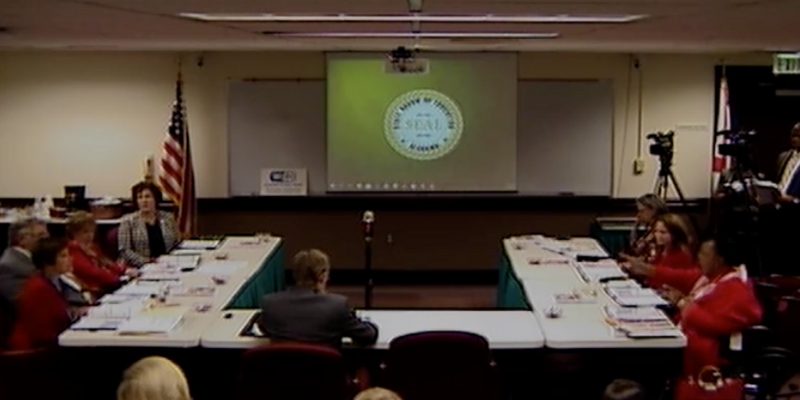
Alabama board of education member Ella Bell, D-Montgomery, spoke out during a work session Thursday claiming that Alabama’s landmark tax credit scholarship program for low income families was part of an effort to “destroy a whole race of people.” “They took money from the poorest counties in the state to send kids to private school,” Bell claimed, after accusing the program of “stealing” from the state. “That’s just awful.” Trouble is, that’s just not true. The small yet popular program created by the Alabama Accountability Act only amounts to one half of one percent of the state’s multi-billion-dollar education trust fund – a fund that has grown well beyond the minuscule cost of providing the scholarships, according to state budget data. And more than 80 percent of the parents who received scholarships last year from the two largest providers are minorities, according to a report. All made at or below 185 percent of the federal poverty level when they applied, as required by law, which is also the eligibility requirement to receive free or reduced priced lunches. Disabled veteran Dalphine Wilson of Montgomery, who is African-American, is one of those parents. The single mother of two uses the scholarships to send her children to private school instead of the city’s troubled public school system. Wilson’s children dropped to one knee in protest during a recent Montgomery County School Board meeting after its members approved a resolution demanding a repeal of the scholarship program. Her daughter wept after the meeting, afraid she’d lose her scholarship. Her son asked if they could leave Alabama. “Parents deserve a choice,” said Wilson, 44, who applied for scholarships after seeing what she described as the “overwhelming” and chaotic culture in her daughter’s elementary school classroom. “And your choice should not be, ‘Gosh, I really hope my child can get into a magnet school, and if they can’t, their only option is this failing school that is under state intervention.’” She said if anyone is stealing, it’s those who want to take away the scholarships. “Why rob us of a choice?” Wilson asked. Ryan Cantrell, a school choice advocate in Montgomery who was an aide in the State Senate when the act passed in 2013, said the program was specifically designed to provide parents like Wilson with a choice that was once only available to higher income families. “We’re talking about families who absolutely had no other option,” he said. “For the life of me, I don’t understand how an elected official could consciously vote to take that away from a low-income child. It boggles the mind.” Cantrell said the “heart of the problem” is that opponents of the scholarship program are primarily concerned with the public education system itself, not the students it was established to serve. “We are so focused … on the adults in the room, and our education system is not built to serve adults,” he said. “Our education system is built to serve students, and whatever it is that works for kids ought to be what we’re doing.” Cantrell also disproved Bell’s claim that the program has been “stealing” from public school systems. On the contrary, he said, public schools have more funding and less students now than when the scholarship program began. Montgomery’s school system, for example, has seen its funding increase by more than $8 million, up 5 percent since 2014, even while the overall student population has decreased by more than 7 percent, according to Cantrell. During the board meeting, Bell also said the program “is absolutely horrifying to me because already I’m black and I grew up in Montgomery County 70-years ago and I know all the tricks.” But the scholarships aren’t a trick. They’re a lifeline, a choice, for thousands of kids who otherwise wouldn’t have one. Alabama shouldn’t allow that choice to be taken away because of past wrongs. The plain fact today is that the Alabama Accountability Act is a tiny fraction of our state’s education budget, it gives low-income families a sometimes life-altering choice, and almost all of the students receiving scholarships are minorities. We should all be proud of that. Because in the end, this is about what we believe education dollars are for – the system or the student. Please call your state legislator and local school board member today and let them know what you think. ••• Rachel Blackmon Bryars is a senior fellow at the Alabama Policy Institute. Contact her at rachel@alabamapolicy.org.
Pepper Bryars: Officials claiming voter suppression in Alabama are crying wolf
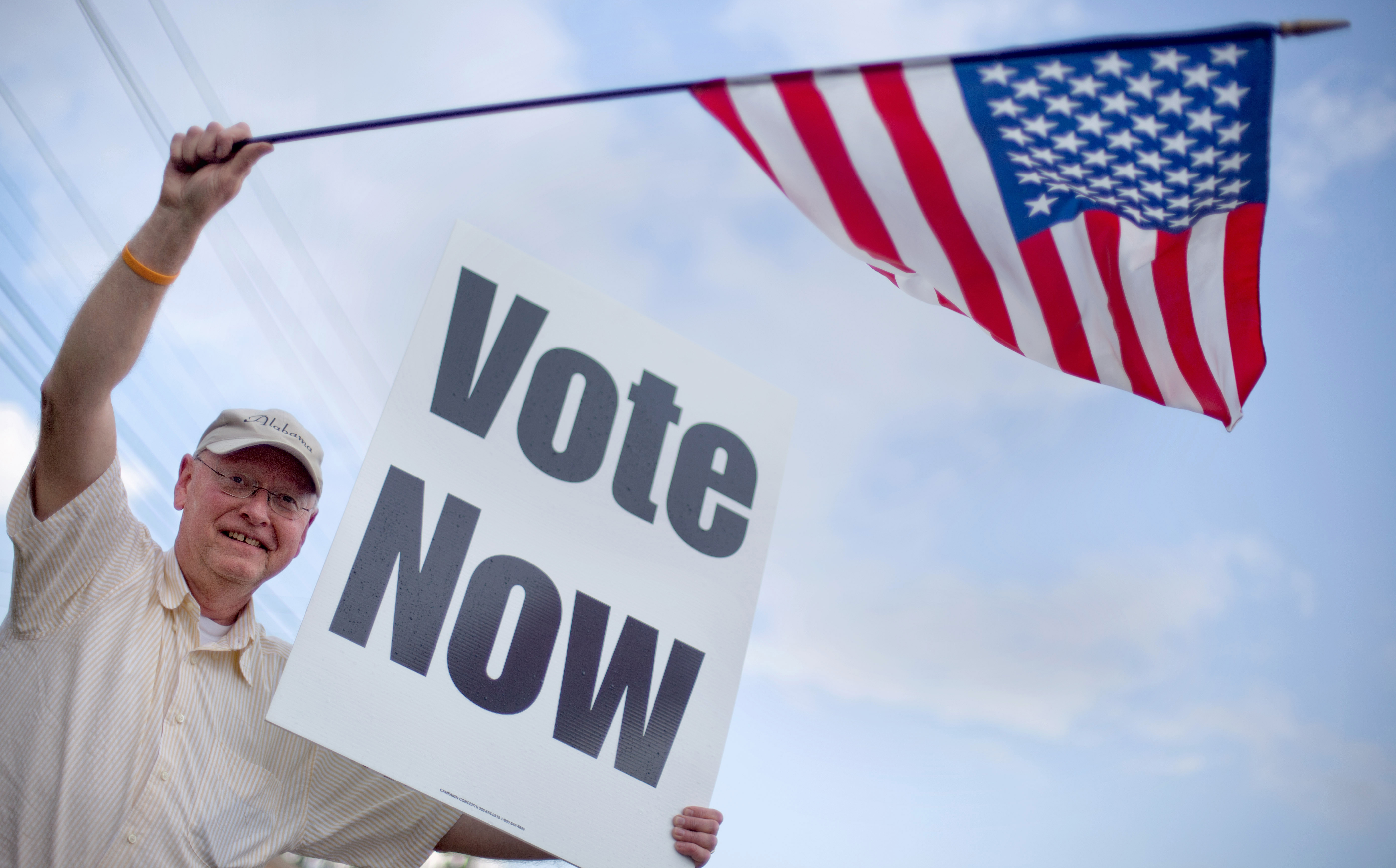
We need words to mean things. The phrase “fake news” has been so widely applied that it’s now essentially meaningless, other than identifying those who would rather dismiss than deal with an argument or evidence challenging their conclusions. The extremely important phrase “voter suppression” is now also tittering on the edge of meaninglessness, thanks in part to the ill-considered efforts of some in the Huntsville area. They’re exaggerating the impact of the routine process that Alabama uses to mail voter I.D. cards and manage its voter lists. Here’s the process. Step one: Register to vote. Step two: Election officials mail you a voter I.D. card, and ask you to verify the information. Step three: Follow the instructions on the card if anything needs to be changed. Easy-peasy. Or not, according to a group that includes Madison County Probate Judge Tommy Ragland, the county’s top voting official. “It’s voter suppression, and it gives our county a black eye,” he told AL.com last week. Suppression? To quote Inigo Montoya, “You keep using that word. I do not think it means what you think it means.” Here’s what’s being alleged: A number of students at Alabama A&M and Oakwood University, both in Madison County, used their campus addresses when registering to vote recently. But when the cards were mailed to those addresses, some of the students reportedly didn’t receive them. The post office sent the undeliverable cards back to county election officials, who, quite reasonably, assumed the lack of acceptance meant an individual had moved. When this happens, people are placed on the “inactive” voter list which means they can still vote but must first update their information. Why do this? If the state doesn’t periodically verify its rolls and move unresponsive voters to an inactive list, then the main list would eventually include any registered voter who ever lived in Alabama – alive, dead, or those who moved away. The rolls would become utterly unmanageable. Why didn’t some students receive the card? Maybe because Alabama A&M doesn’t have individual mailboxes for students, just one big general delivery pile. University staff said they emailed students asking them to pick up their cards, but hundreds still haven’t. Not to worry, though. When they show up to vote and learn that they’re on the inactive list, all they have to do is complete a simple form and are then immediately given a ballot, according to Alabama Secretary of State John Merrill. “It’s a simple one-page voter update form,” Merrill said. “It takes less than three-minutes to complete.” Still, Madison County Commissioner Roger Jones thinks that’s “suppressing their right to vote.” “They have just registered to vote and this is the first time they will be able to vote and then have to go through an ordeal when they go vote Tuesday,” Jones told AL.com. Ordeal? Seriously? It’s a one-page form, commissioner, and while waiting in a line is inconvenient, it’s hardly voter suppression. This is hyperbole and nasty politics at their worst because we’re supposed to assume that this is racist since Alabama A&M and Oakwood have predominantly African-American student bodies. Folks, this hurts us all. We need voter suppression to describe exactly what a reasonable person would assume it means: people being denied their right to vote. Voter suppression is a gravely serious charge that should warrant investigation when alleged, and if proven, it must carry swift and stern punishment. But the way the phrase is being thrown around is remarkably reckless, weakens the strength of the allegation, and reduces the credibility of those making the charge. Those crying voter suppression right now should remember why we teach our children Aesop’s fable of “The Boy Who Cried Wolf.” Because when the wolf really does come around, will any of us heed their cries? ••• Pepper Bryars is the author of American Warfighter. He is a senior fellow at the Alabama Policy Institute. Follow him on Twitter at @jpepperbryars.
Richardson, Snider: Should the progressive movement become pro-life?

Blind spots. We’ve all got them. Some, for example, believe their singing voice to be a divine blessing although it might more accurately be described as a curse. Others assume their Facebook friends want to see their every meal. Still others ignore that they do, in reality, need deodorant. Not all blind spots are this trite, however. History makes that much clear. Alabama is, unfortunately, host to one of the most obvious and horrid of blind spots: the slavery of the Antebellum South. The fact that many slave-owners were faithful church-goers, Sunday school teachers, and reputable members of the community ought to remind us of how even the most evident evils can be hidden from our moral view. Historical blind spots aren’t limited to Alabama, of course. Worldwide aversion to women’s right to vote, German justification for the Holocaust, and even the Pharisaical rejection of Jesus are examples of blind spots in both recent and distant past. The common thread of a moral blind spot, it seems, is this: generally decent people, earnestly desiring to know and act on what is right, completely missing it. That’s the thing about blind spots. We miss them. By their nature we are ignorant of their existence. This means that, without someone pointing them out, I won’t know mine and you won’t know yours. Illuminating these blind spots is a compassionate and worthwhile goal––as long as we are open to confronting our own blurs in vision. Knowing this, we are obligated to point out a major blind spot in the progressive movement: the endorsement of abortion. The progressive movement has prided itself on its support for the historically marginalized and voiceless: women, immigrants, African Americans, etc. There is a real care, a genuine passion, within their ranks to right wrongs that should be encouraging to us all. They desire justice and fairness and, although we may not agree when it comes to the raw policy, that desire should be applauded. When it comes to the most voiceless population, the unborn, the progressive movement fails. Strangely enough, the very rhetoric they decry when levied against minorities is used to justify the killing of yet-to-be-born human beings. In some ways, it makes sense that this blind spot exists within the progressive movement. The battle to ensure women’s voting rights was hard-fought and one that progressives have not forgotten. There is, unfortunately, a lingering suspicion that this battle continues––that men want to control women in whatever ways possible. This suspicion, it seems, has led to an overcorrection in which attempts to eliminate abortion are perceived as anti-women instead of pro-child. Progressives, let’s be clear, this is not a rerun of the right for women to vote. This is about the lives of innumerable unborn children who cannot speak for themselves. This is, in many ways, right in your wheelhouse. Fortunately enough, recent scientific progress makes it easier than ever for progressives to join the pro-life movement. New technologies and scientific studies are consistently showing how early on in development a fetus appears and acts as it is: human. Colleen Malloy, a neonatologist at Northwestern University, stresses this in a recent Atlantic article. She argues that years of study made it “so obvious that these were just developing humans.” Dr. Farr Curlin, a professor of medicine and medical humanities at Duke University, likewise described science’s recent contribution to the debate by saying “ I don’t see any way it’s not an ally to the pro-life cause.” It’s time for the progressive movement to become pro-life. For consistency’s sake, for the sake of unborn children, and for their own viability as a movement, this blind spot needs to be confronted. With compassion, we invite progressives to be true to their stated ideals and support those least able to speak for themselves. ••• Nikki Richardson is Executive Vice President of the Alabama Policy Institute and Parker Snider is Director of Policy Analysis. API is an independent, nonpartisan, nonprofit research and educational organization dedicated to strengthening free enterprise, defending limited government, and championing strong families.
Parker Snider: How to prepare for Russia’s October surprise

Russia is in the business of mind control. They’re not doing it through sinister headgear, satellite interference, or dream invasion like in Inception, though. Instead, Russia seeks to control the minds of Americans through something we all have and spend arguably too much time on: social media. This isn’t news to many of us. For years we’ve heard how Russia infiltrated Facebook and Twitter in an effort to divide our nation during the 2016 election. It seems, however, that Russia’s interference in our last presidential election wasn’t a “one-and-done” deal. Russia, reports suggest, is coming back for more. In a recent press conference at the White House, intelligence officers remarked that Russia is engaged in a “24/7, 365-days-a-year” campaign to influence the 2018 elections through various means, but especially though social media. Recent headlines confirm this reality. Just this summer, Facebook announced that it has shut down over thirty fake accounts that had over 300,000 followers each. Unfortunately, however, this may only be the tip of the iceberg. According to experts, there is 25 to 30 times more fake information from automated political accounts than real interaction between people on their platform. With the 2018 midterms only weeks away, current intelligence suggests that there will likely be an “October surprise” by the Russians in which they increase their misinformation campaigns to have the largest impact. In a recent interview with NPR, Matt Bruen, a former staffer with the National Security Council within the White House, stated, “It is not a question, in my mind, of whether it’s going to happen. It is a question only of when and how large.” Why, though, is Russia so intent on participating in our electoral process? In the editor’s letter to a recent edition of The Week magazine, Mark Gimein–who was born in Russia and whose family found refuge in the states–argues that Russia is driven by “the[ir] overarching ambition of undermining the moral standing of the U.S.” “What the Kremlin’s hackers most want to break into,” he continues, “isn’t voting machine software; it’s the democratic principles of tolerance and the peaceful transition of power.” Russia’s goal is not the election of a specific person or party to power. Instead, Russia wants to sow discord and anger in our ranks through misinformation. They hope to control how we think of our political opponents, with the goal that we will ultimately become our own worst enemy. Russia is in the business of mind control, but there’s good news: we can prepare. The best way to do that is not to eliminate social media from our lives, but to adopt a healthy level of skepticism towards political posts we see on those platforms. Before sharing anything, we each ought to do some basic research and see if any other news organizations are corroborating it. If not, it’s best to wait to see if the story is picked up by reputable news sources. Those inflammatory news stories that are not mentioned anywhere else are likely fake. The Russians are betting that we continue to believe everything we see on social media that lines up with our political views. They’re also hoping that we share it to our friends, and that they share it to their friends. A little fact-checking–even a simple Google search–could severely hamper their efforts. We can win this battle, and I am confident that we will. It may be a little less convenient, but it will ensure our democracy survives in the long-run. ••• Parker Snider is Policy Relations Manager for the Alabama Policy Institute (API). API is an independent, nonpartisan, nonprofit research and educational organization dedicated to strengthening free enterprise, defending limited government, and championing strong families. If you would like to speak with the author, please e-mail communications@alabamapolicy.org or call (205) 870-9900.
API releases guide to the 2018 proposed Constitutional amendments

On Election Day, Alabamians will have the chance to decide whether several proposed amendments should be added to state’s Constitution. But proposed constitutional amendments can be confusing, which is why the Alabama Policy Institute (API) has release a Guide to the Issues on the 2018 Proposed Constitutional Amendments in order to explain the statewide constitutional amendments in plain language to help voters make informed decisions. “Through the explanations and information provided in this guide, the people of Alabama will be able to confidently cast their votes on the constitutional amendments,” reads the API guide. Below are the four proposed statewide amendments, as they will appear on the Nov. 6 general election ballot (without API’s explanations): Proposed Statewide Amendment No. 1 “Proposing an amendment to the Constitution of Alabama of 1901, providing for certain religious rights and liberties; authorizing the display of the Ten Commandments on state property and property owned or administrated by a public school or public body; and prohibiting the expenditure of public funds in defense of the constitutionality of this amendment.” (Proposed by Act 2018-389) Proposed Statewide Amendment No. 2 “Proposing an amendment to the Constitution of Alabama of 1901, as amended; to declare and otherwise affirm that it is the public policy of this state to recognize and support the sanctity of unborn life and the rights of unborn children, most importantly the right to life in all manners and measures appropriate and lawful; and to provide that the constitution of this state does not protect the right to abortion or require the funding of abortion.” (Proposed by Act 2017-188) Proposed Statewide Amendment No. 3 “Proposing an amendment to the Constitution of Alabama of 1901, relating to the Board of Trustees of the University of Alabama, to specify that the congressional districts from which members are appointed continue to reflect those as constituted on January 1, 2018, to remove the State Superintendent of Education from membership, and to delete the requirement that members vacate office at the annual meeting of the board following their seventieth birthday.” (Proposed by Act 2018-132) Proposed Statewide Amendment No. 4 “Proposing an amendment to the Constitution of Alabama of 1901, to provide that, if a vacancy in either the House of Representatives or the Senate occurs on or after October 1 of the third year of a quadrennium, the seat would remain vacant until a successor is elected at the next succeeding general election.” (Proposed by Act 2018-276) API’s guide also includes sample ballots for county’s across the state.
Parker Snider: What you need to know about proposed constitutional amendments 3 and 4
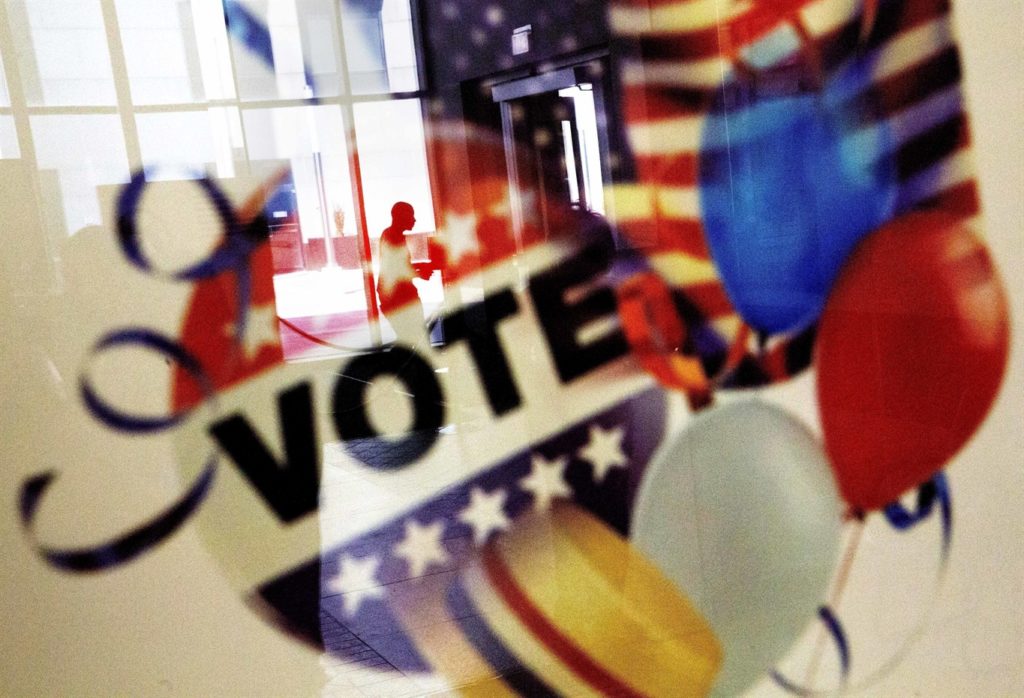
On November 6, Alabamians will vote on four proposed statewide constitutional amendments. Although the first two amendments will likely receive the most attention (API’s analyses can be found on our website), amendments three and four deserve notice as well. They are, in fact, changes to the longest known constitution in the world. We’ll start with Proposed Amendment Three, which addresses the University of Alabama’s Board of Trustees. Currently, the Board of Trustees of the University of Alabama System – which governs UAB and UAH in addition to the Tuscaloosa campus – is composed of three members from the seventh congressional district (which includes Tuscaloosa), two members from each of the other six congressional districts, the governor and the state superintendent of education. If approved, this amendment would require that the Board continue to be made up of members of congressional districts as drawn on January 1, 2018. This means that, in the case that Alabama gains or, more likely, loses a congressional seat in 2020, the makeup of the board of trustees would not be affected nor thrown into disarray. Additional stipulations include the removal of the state superintendent of education from automatic membership on the board and of the requirement that board members retire after their 70th birthday. It is worth mentioning that the bill allowing this University of Alabama-specific amendment passed unanimously in both the State House and Senate. Amendment Four, in contrast, will have a significantly wider impact if approved. This amendment addresses something Alabamians have been hearing about for a while now–special elections. It is important to note on the front end, however, that it does not address special elections for the U.S. Congress like that of 2017. Instead, it impacts vacancies in the state legislature. If accepted, legislative vacancies that occur on or after October 1 of the third year of a quadrennium (in other words, seats that become open only months before the final session of the legislature’s four-year term) would remain vacant until the next general election. Currently, the governor is required to schedule a special election when state legislative vacancies occur. These elections cost the state money, create voter fatigue, and according to Senator Glover, the amendment’s sponsor, are “just bad government.” In an interview with API, Senator Rusty Glover described one case where, thanks to a late special election, a legislator was sworn in on the last day of session. Cases like these, where relatively powerless legislators are added to the state payroll, will not occur if the amendment is approved. The main purpose, according to Glover, is to “save some money and confusion.” He estimates that, if this language had been on the books earlier, the state would’ve saved “just under a million dollars” in 2018 alone. For example, this amendment would prohibit what will, come November, be four separate elections for Alabama’s 26th state senate seat in less than a year. Additionally, the amendment received unanimous support when it passed the Senate and overwhelming support in the House earlier this year. Although these two amendments are not as polarizing as amendments one and two, both are attempts to make the state better, and they should not be ignored. ••• Parker Snider is Policy Relations Manager for the Alabama Policy Institute (API). API is an independent, nonpartisan, nonprofit research and educational organization dedicated to strengthening free enterprise, defending limited government, and championing strong families. If you would like to speak with the author, please e-mail communications@alabamapolicy.org or call (205) 870-9900.
Richardson, Snider: Alabama must vote yes on Proposed Statewide Amendment Two

According to Pew Research, the only state that is more pro-life than Alabama is Mississippi. Our status as one of the leading states in the pro-life movement is both a blessing and a curse. It is a blessing in that our state has successfully passed legislation curbing abortion. It is a curse, however, in the sense that a pro-life failure here could spell disaster for the cause at the national level. This is why, in November, Alabama must set the standard and show the world just how strong the pro-life movement is–by voting yes on Proposed Statewide Amendment 2. The amendment, if approved, would add language to the state constitution acknowledging the sanctity of unborn life and stipulating that the state constitution provides no right to abortion. That’s the technical explanation. In a recent call with the Alabama Policy Institute, however, Representative Matt Fridy, the sponsor of the amendment, described both its intention and impact. Fridy explained that the amendment is not meant to immediately eliminate abortion, but to prevent a problem faced by our northern neighbor. The problem? In 2000, the Tennessee Supreme Court ruled that their state constitution provided higher protection for abortion than the federal constitution. As a result, an array of the state’s pro-life measures were struck down by the court, which argued that they were unconstitutional on the state level. The Volunteer State later passed an amendment–similar to the one we will vote on in November–to specify that their constitution did not, in fact, guarantee any such right. Fridy wants to eliminate any opportunity for what happened in Tennessee to happen here, and this amendment would be effective in that vein. Any further impact, however, would require change on the national level. Alabamians should wholeheartedly support this amendment because we, as a state, overwhelmingly believe in the sanctity of life. For many of us, this belief stems from our Christian values. King David reminds us in Psalm 139 that God knits each of us together in the womb. We are unable to ignore that reality. We also acknowledge the truth described in Genesis, that humans bear the imago dei–the image of God–and are worthy of dignity and respect. Others of us are pro-life because of a non-religious understanding that each member of our species is due protection, including the least developed of us. We protect the lives of the unborn just as we do those recently born, children, and individuals with disabilities–because of their humanity. Regardless of why, we at API are proud that most Alabamians are pro-life. It’s not always easy to hold this opinion, however. Supporters of abortion often highlight the differences between the unborn and born based on physical appearance or mental capacity, suggesting that the unborn are not yet human. These arguments, at times, can seem convincing. Even so, we reject these appeals, recognizing a) the value of all human life and b) that the same dehumanization that euphemizes abortion today was employed in Nazi Germany and 1990s Rwanda to make mass murder seem tenable. It is not unknown to Alabamians that the stakes are high, and we do not lazily adopt this position. Being pro-life leads us to action: I am a mother to four children, including an adopted child with special-needs. Other Alabamians are foster parents, volunteers at local crisis pregnancy centers, or benefactors of pro-life organizations that fight daily for the dignity of all. We also, and this must not be ignored, vote as if unknown multitudes of lives hang in the balance–because they do. Although Proposed Statewide Amendment 2 will not ban abortion within our borders, its unqualified passage will signal to the nation and the wider world that abortion is unacceptable, morally repugnant, and, as many like to say, on the wrong side of history. We must not squander this moment. ••• Nikki Richardson is Executive Vice President of the Alabama Policy Institute and Parker Snider is Policy Relations Manager. API is an independent, nonpartisan, nonprofit research and educational organization dedicated to strengthening free enterprise, defending limited government, and championing strong families.
Parker Snider: Understanding Constitutional Amendment One – The Ten Commandments and Religious Freedom

For years, discussion over the public display of the Ten Commandments has animated Alabama’s political landscape. The issue is so energizing, it seems, that many politicians frame their own races through the lens of this battle––that support for their candidacy is a vote for the Ten Commandments. Even so, Alabamians have never actually gotten a chance to vote directly on the issue. This November, however, a constitutional amendment sponsored by Senator Gerald Dial provides that opportunity. Statewide Amendment 1, if successful, would enshrine in the state constitution language signifying two things, a) that the Ten Commandments is authorized to be displayed on public property, including public schools and b) that no person’s religion can affect his or her political or civil rights. This amendment, as expected, has received its share of support and criticism. Dean Young, Chairman of the Ten Commandments PAC, suggests this to be a vote where Alabama decides if we “want to acknowledge God”. He also remarks that we will be held accountable for our vote on judgment day. Not all Christians agree with Young, however. The Baptist Joint Committee, for example, argues that “the government should represent all constituents regardless of religious belief” and not involve itself in “religious favoritism”. The question, of course, is of the real impact of this amendment. Essential to the discussion of impact is one provision within the amendment that may be easily ignored: the fact that any Ten Commandments display must comply with constitutional requirements. This provision explicitly acknowledges that Ten Commandments displays in Alabama are subject to the U.S. Constitution, and therefore the U.S. Supreme Court. The U.S. Supreme Court, it is important to note, has largely settled on an understanding of the constitutionality of this issue through three precedent-setting court rulings. In McCreary County v. ACLU, the Supreme Court ruled that the display of the Ten Commandments in a Kentucky courthouse was unconstitutional. In Van Orden v. Perry, however, the Court allowed the Ten Commandments to be displayed, provided it was within a larger array of historical monuments and markers. In regard to the display of the Ten Commandments in public schools, the Court ruled in Stone v. Graham that posting the Ten Commandments in every public school classroom, as required by a Kentucky law, served “no secular purpose” and was therefore unconstitutional. As this amendment is subject to these precedents and already-existing First Amendment protections, the approval or rejection of this amendment will likely have limited immediate impact in Alabama. What, then, is the purpose? In a recent call with the Alabama Policy Institute, Senator Dial––the sponsor of the amendment–– answered that question. He acknowledged that, for the amendment to have greatest impact, the U.S. Supreme Court will have to rule differently in the future. Senator Dial also offered another reason to support the amendment. He remarked that this amendment would shift liability from the individual or government office displaying the Ten Commandments to the state. The hope of this amendment is to embolden displays of the Ten Commandments under the legal protection of the state constitution, Dial suggests, and to let the state deal with any legal ramifications. It is important to mention, however, that the amendment specifies that no public funds can be used to defend its constitutionality. If there are legal challenges, Senator Dial suggests that a third party will fund the defense. To be sure, this amendment brings yet again to the public eye an issue that some consider settled. The Supreme Court precedent will––new rulings notwithstanding––supersede any constitutional amendments the people of Alabama pass or fail to pass on the subject. If the U.S. Supreme Court were to, however, overturn past precedent, the success or failure of this amendment could be consequential. ••• Parker Snider is Policy Relations Manager for the Alabama Policy Institute (API). API is an independent, nonpartisan, nonprofit research and educational organization dedicated to strengthening free enterprise, defending limited government, and championing strong families. If you would like to speak with the author, please e-mail communications@alabamapolicy.org or call (205) 870-9900.
Parker Snider: Prepare to vote on constitutional amendments, Alabama
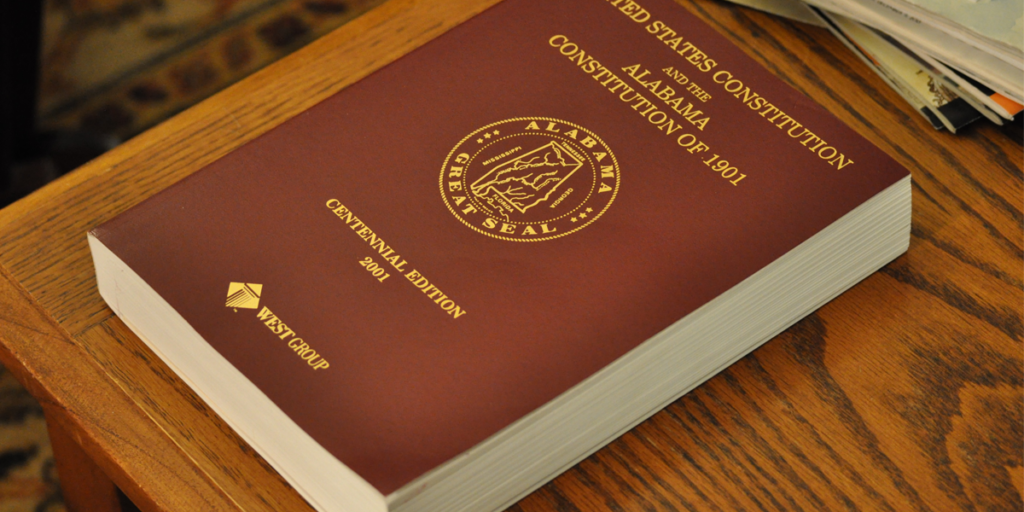
The drought, as they say, is over. Football season is back in Alabama. To no one’s surprise, the Alabama Crimson Tide was ranked #1 in both the AP and Coaches preseason polls. Almost simultaneously as the return of college football, however, is the beginning of another all-too-familiar season for Alabamians. That season, of course, is election season. In this season, as in the college football season, Alabama earns a number one ranking. This ranking isn’t for being the state with the most elections, however. No, this additional #1 ranking is for our massive state constitution, the longest constitution in America and, perhaps, the world. Our constitution is well over 300,000 words–that’s forty times longer than the U.S. Constitution. The only governing document that rivals the size of Alabama’s is that of India, although it is still less than half as lengthy. Our constitution’s depth, it seems, is due to the 928 amendments that have been added since the constitution’s inception in 1901. Although some amendments are substantive and generally applicable to the entire state, a large portion of the amendments only deal with a singular county. This is because the Constitutional Convention of 1901, in an effort to regain control of the state after Reconstruction, concentrated power so heavily in Montgomery that many local decisions were, and still are, not legally permitted without an explicit change in the constitution, e.g. a constitutional amendment. This means that anytime a county wants to, for example, levy a minor tax, institute local term limits, or create a toll road, a constitutional amendment is required. In November, Alabamians will have the opportunity to make the state constitution even longer. This year, residents will vote on four statewide constitutional amendments, a relatively small number in light of the fourteen voted on in 2016. Included on the ballot will be constitutional amendments concerning the public display of the Ten Commandments, abortion, the University of Alabama’s Board of Trustees, and special elections for legislative vacancies. Although it is easy to treat constitutional amendments as an afterthought (they are, in fact, at the end of the ballot), it is important to understand the potential impact of a change to the state’s most significant document. Unfortunately, the language describing constitutional amendments on the ballot is often difficult to understand. Additionally, there is no description of the effects of a proposed amendment. This can be disheartening to voters taking their voice in the electoral process seriously while at the same time encouraging split-second decisions and absent-minded bubbling. Neither of these cases are desirable. That’s why, in the upcoming weeks, the Alabama Policy Institute will release op-eds on the constitutional amendments in easy-to-understand language, including the possible effects, or lack thereof, on the state. We will also be releasing a one-stop Guide to the Issues that will explain the amendments concisely and readably in a format that can be taken into the voting booth. Stay tuned. ••• Parker Snider is Manager of Policy Relations for the Alabama Policy Institute, an independent, nonpartisan, nonprofit research and educational organization dedicated to strengthening free enterprise, defending limited government, and championing strong families.


